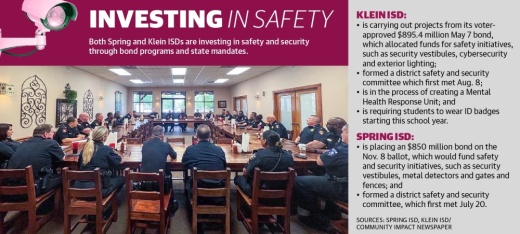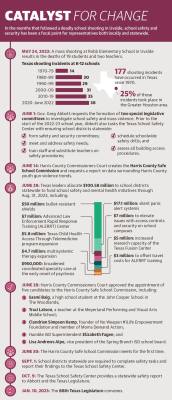State and local leaders are ramping up safety and security efforts as the 2022-23 school year begins and the next legislative session approaches, three months after 19 students and two teachers died in a mass school shooting in Uvalde.
Over the summer, state legislators allocated new funding to school districts statewide to support school safety and mental health initiatives, while Spring and Klein ISDs are curating bond packages to provide additional support for both students and staff.
On June 13, KISD officials initiated the first projects included in the district’s $895.4 million bond program approved by voters May 7, prioritizing many of the safety- and security-related projects. Meanwhile, the SISD board of trustees voted Aug. 9 to place an $850 million bond referendum on the Nov. 8 ballot. If approved, SISD’s bond would also allocate funding for safety and security enhancements districtwide.
Marlon Runnels, who became KISD’s chief of police following the retirement of former chief David Kimberly on June 2, noted the district has police presence on every campus every day.
“There’s an expectation in Klein ISD that safety is everyone’s responsibility,” Runnels said. “Their chief of police is not just the chief of police; he’s a parent in Klein ISD. And I take my role and responsibility in protecting my kids and every parent in the district’s kids very seriously.”
Since 1970, 177 shooting incidents have occurred at K-12 schools in Texas with nearly 25% taking place in the Greater Houston area. Data also shows 38 of those Texas incidents happened between January 2020 and June 2022—the most of any decade prior.
“We have experienced fairly steady growth since [the 1990s],” said Mo Canady, executive director of the National Association of School Resource Officers. “School shootings drive demand [for school resource officers]; there is no question about it. I wish it was not that way, but it is.”
Statewide response
One week after the May 24 shooting in Uvalde, Gov. Greg Abbott requested the formation of two special legislative committees to investigate school safety and mass violence.
“This is the fourth mass casualty event that we’ve had in Texas since I’ve been in office,” said state Rep. Dan Huberty, R-Houston, the previous House Public Education Committee chair, during a June 14 State of the State address. “The reality is that I look at this and say, ‘We’re culpable. I’m culpable.’ We’ve got to do something.”
On June 28, state leaders allocated $100.58 million to school districts statewide, which included $50 million for bullet-resistant shields and $17.1 million for the Texas Education Agency to help school districts purchase silent alert systems, among other school safety and mental health initiatives.
According to state leaders, the funding comes from a budget surplus in the Foundation School Program and therefore will not impact current school operations or funding.
“Funding these much-needed initiatives marks the first of many steps that we will take at the Legislature to respond to the horrific events in Uvalde and prevent another tragedy like this from happening again,” Texas House Speaker Dade Phelan said in a June 28 news release.
Additionally, on June 1, Abbott tasked the Texas School Safety Center with ensuring school districts statewide form safety and security committees, meet and address safety needs, train staff and substitute teachers on safety procedures, schedule schoolwide safety drills and assess all building access procedures. School districts will be required to complete the safety tasks and report their findings to the TSSC by Sept. 1.
The center will then provide a statewide safety report to Abbott and the Texas Legislature by Oct. 9.
Local efforts
Locally, the Harris County Commissioners Court voted unanimously June 14 to request a report on county youth gun violence and create the Harris County Safe School Commission. The court later approved the appointment of five members to the commission June 28, among which were a high school student, a teacher, a superintendent, a school board member and a parent who lost her child to gun violence. The commission met for the first time June 30.
During an Aug. 3 news conference, Precinct 3 Commissioner Tom Ramsey said the findings of the commission would be made available within a few weeks.
“The safe school commission was set up for one reason: that’s to listen, because when things like Uvalde happen, sometimes we try to come up with solutions without listening,” Ramsey said. “These folks have gotten in a room, [and] they’ve left the politics at the door.”
Harris County Precinct 4 Constable Mark Herman said efforts have been made by his office to increase the number of law enforcement officials available to districts throughout the precinct, which includes Spring and Klein ISDs.
“My office will be dedicating hundreds of deputy constables to the local districts throughout the rest of the year,” Herman said during an Aug. 8 news conference. “Looking at our operational plans that we have in place, we have our schools covered.”
Districtwide investment
Both Spring and Klein ISDs have had safety and security committees in place since 2019, which most recently met on July 20 and Aug. 8, respectively. District officials said they have also been working to complete the state-mandated safety tasks ahead of the Sept. 1 reporting deadline.
Of KISD’s total May 7 bond package, $843.8 million was allocated for Proposition A, a portion of which was allocated for districtwide safety and security enhancements: security monitoring improvements at every school; districtwide cybersecurity enhancements; exterior and parking lot lighting replacements and upgrades; and the addition of security vestibules at Klein Oak High School and at Doerre, Kleb and Klein intermediate schools.
“Thankfully, our community in May passed our bond, so in Proposition A, there was a lot of money allocated for safety enhancements, and on the heels of Uvalde, the board in June voted to move forward some of those bond projects on our intermediate campuses to address some of the safety enhancements on those campuses to include those vestibules that may not have them already in place,” Runnels said.
Starting this school year, Runnels also said all secondary KISD students are required to wear ID badges, while elementary students will be required to wear ID badges on their backpacks. Known as Smart Tags, Runnels said students will also use the ID badges to get on and off the school bus, pay for school lunches and check out library books.
The district is also creating its own Mental Health Response Unit, which Runnels said will partner peace officers and counselors together to help triage crisis situations with students and employees. Runnels noted the district is still in the early stages of creating the unit and did not specify an estimated launch date.
If approved by voters, Proposition A of SISD’s Nov. 8 bond will include $681 million for Proposition A, a portion of which will fund safety and security enhancements districtwide, such as the replacement of 19 police vehicles, shooter-detection systems, security vestibules with bulletproof glass and enhanced metal detectors, among other projects.
SISD Police Chief Ken Culbreath noted the district has consistently placed safety as a top priority, and plans to continue increasing training and communications concerning standard response protocols.
“We have made a substantial commitment to increasing training and enhancing physical systems and technical systems,” Culbreath said.
Andrew Christman, Wesley Gardner, Emily Lincke and Hannah Norton contributed to this report.







